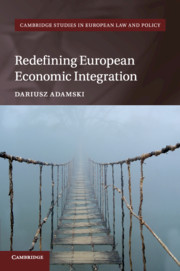Book contents
- Redefining European Economic Integration
- Cambridge Studies in European Law and Policy
- Redefining European Economic Integration
- Copyright page
- Contents
- Series Editors’ Preface
- Acknowledgments
- Abbreviations
- Table of Treaties, Instruments and Legislation
- Table of Cases
- Introduction
- 1 The Eurozone’s Original Sins
- 2 Dead Rules Walking
- 3 Thirty Pieces of Silver in Exchange for Sovereignty?
- 4 The Frankfurt Alchemist
- 5 Shock Absorbers
- 6 Redenomination
- 7 Centrifugal National Institutions and Public Policies
- 8 European Redistributive Policies: Grass-Sprinkling Instead of Rebuilding the Garden
- 9 The Internal Market: Disunited in Diversity
- 10 The EU and the Hidden Costs of Maximum Globalisation
- Summary: Rerouting the European Project
- Bibliography
- Index
6 - Redenomination
Published online by Cambridge University Press: 12 April 2018
- Redefining European Economic Integration
- Cambridge Studies in European Law and Policy
- Redefining European Economic Integration
- Copyright page
- Contents
- Series Editors’ Preface
- Acknowledgments
- Abbreviations
- Table of Treaties, Instruments and Legislation
- Table of Cases
- Introduction
- 1 The Eurozone’s Original Sins
- 2 Dead Rules Walking
- 3 Thirty Pieces of Silver in Exchange for Sovereignty?
- 4 The Frankfurt Alchemist
- 5 Shock Absorbers
- 6 Redenomination
- 7 Centrifugal National Institutions and Public Policies
- 8 European Redistributive Policies: Grass-Sprinkling Instead of Rebuilding the Garden
- 9 The Internal Market: Disunited in Diversity
- 10 The EU and the Hidden Costs of Maximum Globalisation
- Summary: Rerouting the European Project
- Bibliography
- Index
Summary
- Type
- Chapter
- Information
- Redefining European Economic Integration , pp. 191 - 230Publisher: Cambridge University PressPrint publication year: 2018



